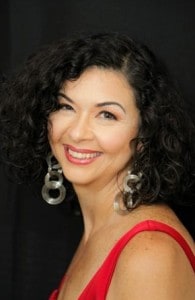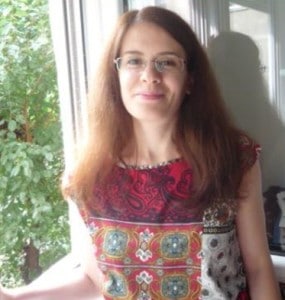 Patricia Brenes is the owner of the blog inmyownterms.com. Originally from Costa Rica, she moved to Washington in 2000 to work for the Inter-American Development Bank. She obtained her Master’s Degree in Specialized Translation at the Universitat de Vic in Barcelona. She also has a Terminology Manager certification (ECQA) from TermNet. Her blog collects useful information on theory and practice, as well as infographics, biographies, interviews, tools and much more.
Patricia Brenes is the owner of the blog inmyownterms.com. Originally from Costa Rica, she moved to Washington in 2000 to work for the Inter-American Development Bank. She obtained her Master’s Degree in Specialized Translation at the Universitat de Vic in Barcelona. She also has a Terminology Manager certification (ECQA) from TermNet. Her blog collects useful information on theory and practice, as well as infographics, biographies, interviews, tools and much more.
Why is terminology your passion and what motivated you to create your blog Inmyownterms.com about terminology?
Actually, my passion and my blog were born at the same time. InMyOwnTerms is the result of the European Certification & Qualification Association (ECQA) certification as Terminology Manager that I obtained from TermNet in April last year and the blog was my final project. I had taken some short webinars before the certification, but it wasn’t until I enrolled in the certification that I realized that terminology was my passion. I also started looking for online resources and realized that they were scattered and sometimes not so easy to find. Therefore, the idea of a blog to share that knowledge was born. I added “For beginners and beyond” to the name because I also realized that a first contact with Terminology might be scary, since the theoretical part can be hard to digest. So I tried to write posts introducing simple concepts and giving the sources for further reading.
Can you tell us what future plans do you have for your blog?
It is hard to say what the future holds. I believe that I will keep doing what I do, with the same enthusiasm. A blog has to look alive from the moment you open it. Just like your first job interview, you need to leave a good first impression and attract the reader’s attention so that s/he comes back for more. I’ll continue writing about what I find useful, interesting and entertaining. It’s like when you give a present to a loved one: you buy something that you would buy for yourself because you know s/he will like it. My blog posts reflect what I like to write about and I hope my readers will also like them.
How was your stay in Luxembourg at TermCoord?
My visit to TermCoord was the best work experience that I’ve had outside my full-time job not only due to the knowledge that has been shared with me but also due to the warmth of people who were always willing to talk to me patiently. They make up an excellent team, from staff to trainees, committed to their work and to terminology. It was an experience that I will never forget and I hope that I can come back some day.
What do you think about the public IATE termbase? How do you perceive it now after your study visit at TermCoord?
I am really impressed with all the tools and resources that translators have available here to make their work a bit easier. It was interesting to see IATE from the inside since I had only used the public version. Learning about how it works internally was an eye-opening experience. It is not an easy job when you have to record information from so many languages, and the challenge of keeping it updated is expertly done not only by the staff but also by the trainees who I could also see are committed to making it better every day.
What specific skills should a terminologist have? What is your opinion on the role of the Terminology Manager?
I believe it has to be a mix of hard and soft skills. You can get the hard skills by taking courses, such as the ECQA certification, which gives you a good foundation and useful tools, or if you are looking for a university career, there are excellent universities that offer special programs such as Universitat Pompeu Fabra‘s (UPF) online English program: you can take individual courses or the full Master’s program. For the soft skills, I have always believed that regardless of your career, you need to work on your EQ (emotional intelligence). No matter how skilled you are at your job, if you don’t have “people skills” doors will be closed. The Terminology Manager profession has been associated to that of the Terminologist. Although it is true that they are usually interchangeable, the Terminology Manager or Terminology Project Manager usually works in a corporate environment and needs to develop project management skills. Therefore, the TM has to oversee every aspect of a terminology project, deal with stakeholders, write his business case for terminology, and know how to handle resources and time while keeping quality in mind.
Do you think it is useful for companies to have their own termbases?
Not only do I think it’s useful, but it should also be mandatory for companies to have termbases, ideally even before a translation project starts. It has been shown many times that productivity increases when you manage terminology effectively by using the appropriate tools and by following the principles of terminology. Every company should have a business case outlining all the facts that demonstrate the benefits of managing terminology in terms of savings in delivery times, more efficient use of resources and money, as well as enhanced quality of translations.
You wrote an article on your blog about terminologiphobia. What is it and what can we do to fight against it?
Terminologiphobia is the fear that students have when approaching terminology for the first time. It was coined by Mark D. Childress and I’ve used it in my blog because it reflects precisely its essence, the reason why it was created: to take the fear factor out of Terminology and allow people to see that you can learn about terminology one step at a time, in a related context. In my blog post I also suggest that readers go to other resources such as TermCoord‘s excellent page and read about their traineeships, download their e-books, check out their toolbox collection and subscribe to their blog. Let the Terminology bug bite you!
How do you come up with topics and what motivates you to continue writing?
The topics come from various sources: books that I’m reading, tweets, my own readers, etc. For example, after reading lots of articles on Terminology, names like Wüster and Schlomann kept popping up. I wondered who they were and what their contribution to Terminology had been. That’s how the biographical Section “Who is Who in Terminology” was born. The readers’ positive reaction and feedback is what motivates me. When people from Chile to Saudi Arabia write to let me know how much they enjoy reading my blog, that’s the fuel that keeps me going.
The right term is very important at the right moment. Could you describe to us a situation in which a term complicated your life?
It is hard to remember a specific case but it is also hard to forget the times when you spent hours and hours looking for that term that escaped you no matter what. But the reward, that “Aha!” moment when you discover it, is worth the effort.
You gave a one-hour presentation at TermCoord entitled: Building a blog on terminology: from rags to riches. What difficulties did you encounter when creating the blog? How did this blog change your life?
When I started the blog I had a lot of material, but the biggest challenge was to learn how to create a blog and how to use social media. That took a long time of trial and error, but without social media to reach out to potential readers you won’t do much, even if you have a good blog. This experience has changed my life in many positive ways, but the most important aspect is that I have met excellent human beings who are also passionate about Terminology. The fact that I was able to visit TERMCAT and UPF in Barcelona and now TermCoord in Luxembourg (learning and sharing with the staff) has been a tremendous motivation. Meeting in person the people who have been supporting my blog from day one is priceless!
Interviewed by Simona-Luiza Ţigriș. Trainee in the Terminology Coordination Unit.
 Born in Bucharest, Romania, in 1985. She has a bachelor’s degree in English and Spanish Philology from the University of Bucharest. Master’s diploma in Specialized Translation and Terminology Studies and PhD in Philology from the University of Bucharest. Her thesis focuses on discourse analysis and pragmatics.
Born in Bucharest, Romania, in 1985. She has a bachelor’s degree in English and Spanish Philology from the University of Bucharest. Master’s diploma in Specialized Translation and Terminology Studies and PhD in Philology from the University of Bucharest. Her thesis focuses on discourse analysis and pragmatics.
Simona has worked so far as an assistant manager, translator and teacher. She is passionate about languages, terminology, literature and cultural studies and she likes travelling, writing and exploring new pathways. Simona is also a member of the Romanian Association for International Cooperation and Development. The traineeship at TermCoord is a huge step forward in the world of terminology!
You can also read a more recent interview with Patricia Brenes by Dan Lifton here.
